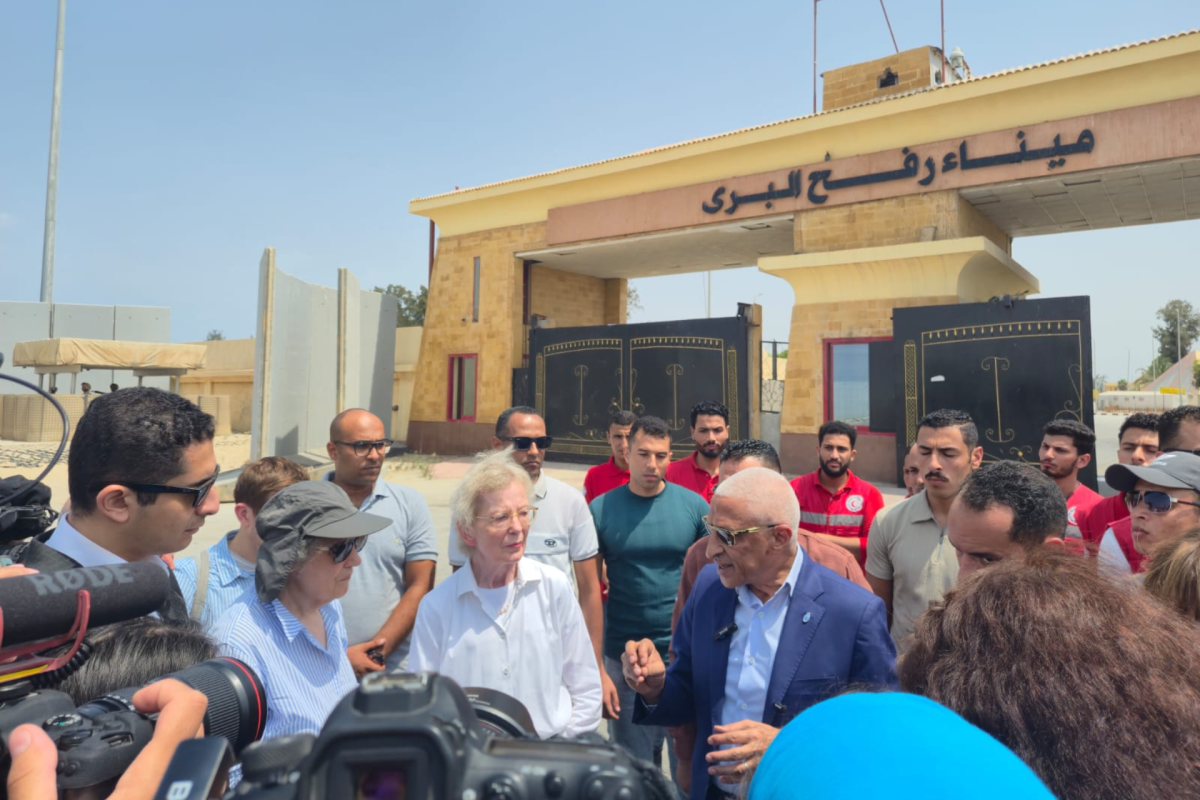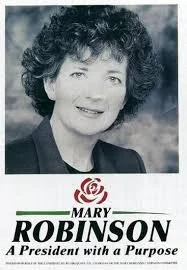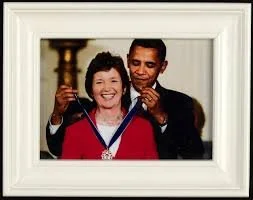Shining a light on Mary Robinson
Mary Robinson is back in the news. Which means the news must be grim. It is.
“What we saw and heard underlines our personal conviction that there is not only an unfolding, human-caused famine in Gaza. There is an unfolding genocide.”*
Mary Robinson, speaking for a group of retired heads of state called The Elders. She served as Ireland’s President from 1990 to 1997. One of her campaign promises was to raise the profile of the office of President of Ireland - Uachtarán na hÉireann.
She kept that promise. As a result, she was the center of attention near the border of Egypt and Palestine August 9 - 12 trying to get the world to pay attention to the plight of the people of Palestine.
Mary Robinson Dossier
Mary Robinson, Ireland’s seventh President and first woman elected to the Aras (Ireland’s White House), either introduced Ireland to its future or ruined its past. Or both. She has more fans than critics these days, but all sides would agree, Ireland will never be the same way it was when she barely got elected in November 1990.
I was elected by the women of Ireland, Mná na hÉireann, who instead of rocking the cradle...rocked the system!
— Mary Robinson, Victory speech, 9 November 1990
Before Robinson (nee Bourke) was elected Uachtarán na hÉireann in 1990, condoms and birth control pills were illegal; women had to retire from teaching and other government positions when they married; women couldn’t serve on juries; women were paid about half the rate men were for similar jobs; there was no equality in a marriage and homosexuality was a crime. Image Magazine
That all had changed in Ireland by the time she left office in 1997 to become the UN High Commissioner for Human Rights.
As the world has seen since then, Mary Robinson elevated the office. Other than Eamon de Valera, can you name one of the six men who held the post before her?**
“I really had a mission, to show the people of Ireland the Presidency could stand for more; that it’s directly elected by the people. It’s not an executive office but it has a huge amount of work that could be done.”
Keep that in mind when Irish voters go to the polls in November to elect their ninth president since independence. They’ll be looking for more than a glorified figurehead, more than some kind of civilian royalty. (How limited were the powers of the President? In 1991 President Robinson was invited to England to give a speech on the condition of women and the family in Ireland. The real power in Ireland, the Taoiseach Charles Haughey, invoked the Irish Constitution clause which allowed hm to stop the President from travelling to another country. The establishment feared what she might say. She had to stay home in Ireland.)
None of those societal changes in he 1990s came without a fight. Mary Robinson’s victory in November 1990 was an upset. She became the first Labour Party candidate, the first woman, and the first non-Fianna-Fáil candidate in a contested presidential election to win the presidency. (She left the Labor Party to become an Independent.)
Her critics
In the most recent polling from Ireland, 74% of Irish adults favor statehood for Palestine. Pro-Palestine marches in downtown Dublin routinely draw thousands these days. In her support for the people of Palestine, Robinson has been consistent, long warning that war was inevitable if a two-state solution wasn’t reached with Israel.
Robinson’s critics have long derided her “persistent anti-Israel bias” and "one-sided criticism of Israel.” When President Obama awarded her the Presidential Medal of Freedom, John Bolton offered this, "Those in the administration who recommended her either ignored her anti-Israel history, or missed it entirely, as they either ignored or overlooked her hostility toward America's role in promoting international peace and security. Or perhaps they share Ms. Robinson's views.” Forty-five Republican members of the House registered an official protest. She's much more NPR than FOX News.
Her legacy
A story from the 1990 campaign. Coming up on the early November election, it was too close to call between Robinson and the Fianna Fail candidate. Then, a leading politician from Fianna Fáil, Padraig Flynn, went on a popular Saturday morning radio show and said,
“Mary Robinson reconstructs herself to fit the fashion of the time. She was pretty well constructed before this campaign by her handlers. She has her new clothes and her new look and her new hair, too, and she has the new interest in family, being a mother and all that thing.”
Mrs. Robinson was shocked. “Padraig Flynn attacked me in a very personal way, which hurt me afterwards, implying that I had a false persona just for the presidency. But it completely backfired. A lot of Fianna Fáil women rang me and asked to be disassociated from that. They were very hurt by it. It certainly got the women of Ireland out to vote.”
Or this, from President Obama.
The only girl in a family of four brothers, Mary Robinson learned early on what it takes to make sure all voices are heard. As a crusader for women and those without a voice in Ireland, Mary Robinson was the first woman elected President of Ireland, before being appointed U.N. High Commissioner for Human Rights. When she traveled abroad as President, she would place a light in her window that would draw people of Irish descent to pass by below. Today, as an advocate for the hungry and the hunted, the forgotten and the ignored, Mary Robinson has not only shone a light on human suffering but illuminated a better future for our world.
*Israel has repeatedly denied famine and genocide were happening in Gaza.
Prime Minister Benjamin Netanyahu this week said if his army had a policy of starvation "no one would be alive two years into the war".
** Douglas Hyde. Sean T. O'Kelly. Eamon de Valera. Erskine Childers. Cearbhall Ó Dálaigh Patrick Hillery.



